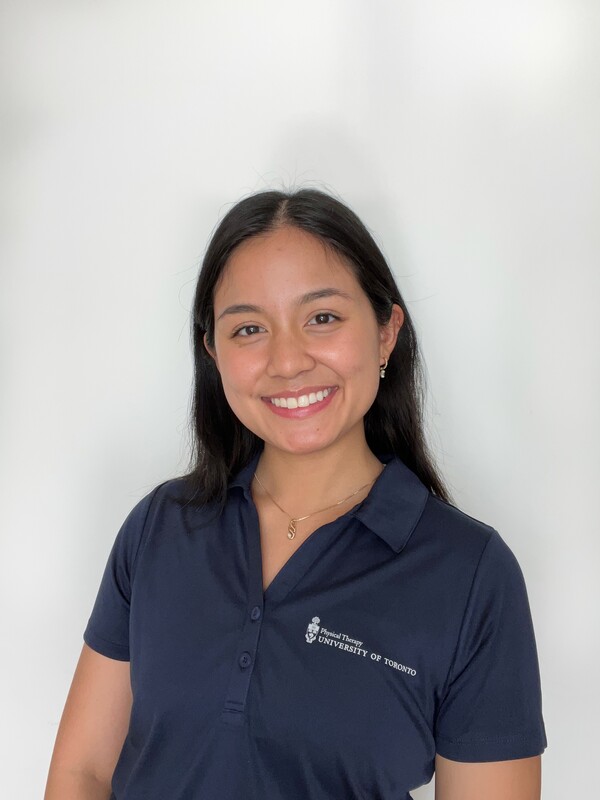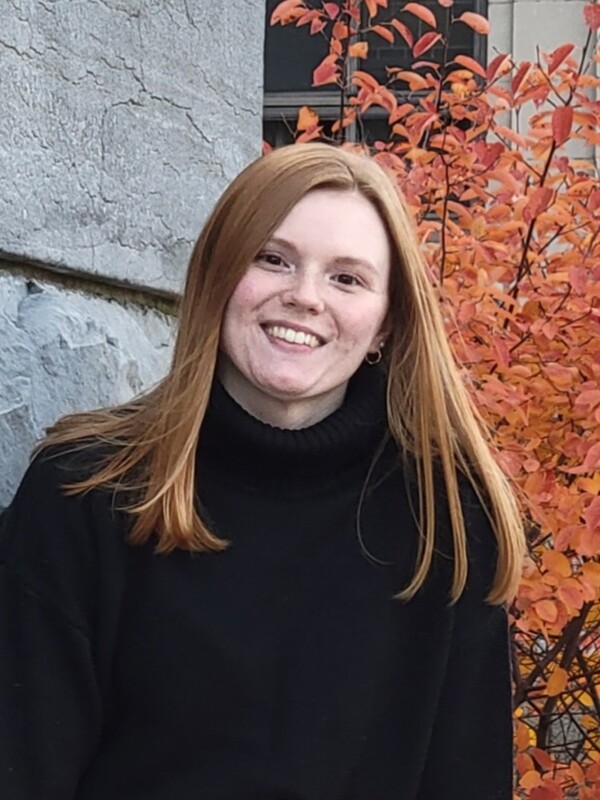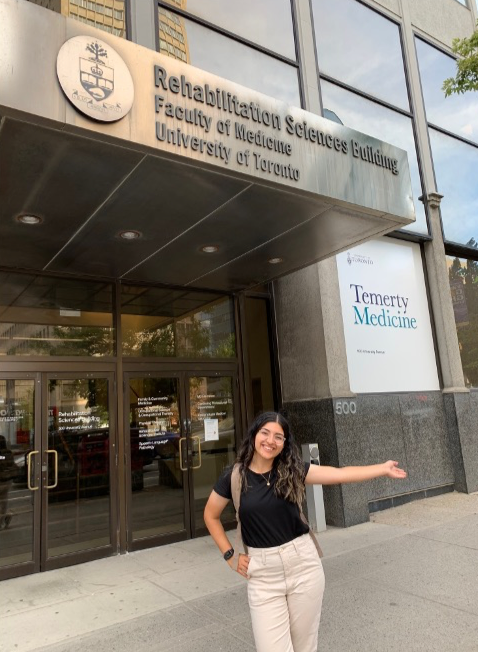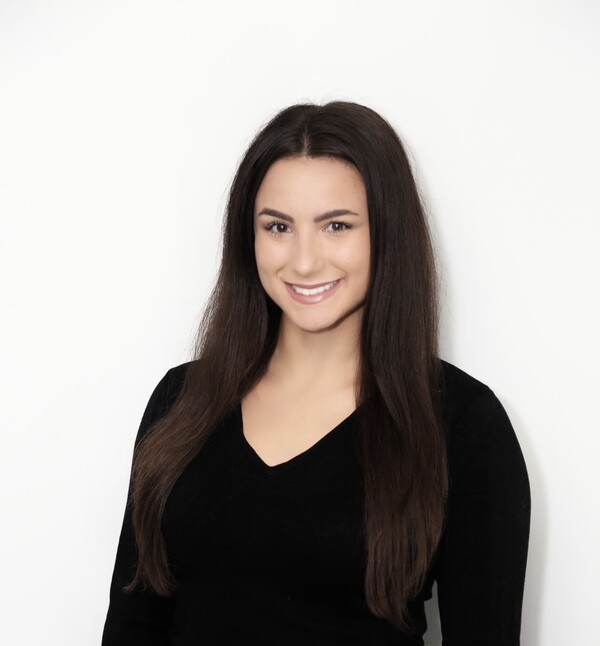Q&A: A Day in the Life of a First-Year Physical Therapy Student
We asked four first-year physical therapy students to share some insight into a typical day in their life as a student, how they have managed the transition from undergraduate to graduate studies and what they have been surprised to learn about the field of physical therapy.

What time do you typically wake up and start your day?
Alyssa: My day is structured around my school schedule. I typically wake up at least 1 hour before class, but sometimes 2 hours if I plan to go to the gym first.
Jacqueline: I usually wake up at 7:30 a.m. for class at 9 a.m. Sometimes it’s 7:45 or 8 a.m. because I like sneaking in as much sleep as possible. I live a 15 to 20 minute walk from school so I can sleep in more than some other students.
Noor: This can vary from day to day! We typically start our days at 9 a.m., and I’ll wake up around 7 a.m. to workout, eat a nutritious breakfast, and walk to over to class.
Simona: I wake up at 8 a.m. Fortunately, I live a five minute walk away from class so I don’t need too much time in the morning before class begins.

What types of classes do you have?
Alyssa: Every day looks a little different in Physical Therapy school, but typically we have one or two lectures in the morning, followed by an afternoon clinical skills lab session.
Jacqueline: Our classes vary depending on what unit we are in, however, we can generally expect to have classes on anatomy and physiology, exercise, conditions that physical therapists (PTs) commonly encounter, clinical skills/clinical decision making and planning, and some more logistical things about being a PT like communicating with patients and other professionals, funding options available for PTs, and the practice standards that PTs need to follow.
Noor: We’re currently in our neuroscience unit and have a mix of clinical skills labs, anatomy labs, lectures, and self-study modules! In our clinical skills labs, we learn techniques and skills used in the realm of neurological physiotherapy and get time to practice them with our peers. It’s one of my favorite parts of the week because we get to apply our knowledge to different cases presented in lab. In our anatomy labs, we get to learn and appreciate the brain and structures we’re learning about in our neuroscience classes through examining cadavers.
Simona: It changes every day! Right now we have lots of neuroscience lectures, Clinical Skills Labs, anatomy lab, some self-study modules on different neurological conditions which is then followed by an in-class session, and movement analysis classes.

What types of assignments or projects do you work on?
Alyssa: Our assignments and projects depend on the unit we are currently in. For example, in our Cardiorespiratory PT Unit, we had an assignment where we critically evaluated a physiotherapist performing suctioning. We highlighted what went well and what could be improved in their technique.
Jacqueline: We’ve had projects related to different medical conditions that PTs may encounter, one about issues within physiotherapy and health care, and others exploring our critical thinking skills.
Noor: We’ve had a variety of group and individual work so far. In our current neurological unit, we’ve had the opportunity to work on a documentation assignment to get more familiar with charting and creating a patient plan. At the beginning of PT school, we also worked in pairs on an assignment to improve our subjective history taking skills and get feedback from our peers.
Simona: We are working on an assignment where we discuss a topic related to physical therapy (i.e. health care labour shortages). We also have weekly case discussions with our small groups, so we always have to prepare ahead of time for those.

How do you manage your time between classes, studying, and other responsibilities?
Alyssa: As a master's student, I'm still learning how to "master" balance between multiple responsibilities. I have found that creating daily goals and using an agenda has helped me manage my time. I also make an effort to get involved in extracurriculars, while still studying and practicing my hands-on skills. For example, I work as a Clinical Extern at SickKids where I apply what I learn in the classroom to real patients, such as transfers and taking vital signs.
Jacqueline: I like to have everything organized and planned out so I rely heavily on my agenda. On the weekend I will plan out what I want to get done each day after school. I try my best to keep up with my notes because I like to make summaries to study from. I just find it makes it easier to have all the important information in one place when I am trying to study for tests.
Noor: I’m a big fan of a planner and will always take the time to write a to do list for every day of the week on the Sunday before the week starts. I’ll write all my school tasks, extracurricular tasks, and general tasks that have to get done. I find this helps me prep my brain for the week ahead and helps me understand where I will possibly have a bit of wiggle room to add in any additional things that pop up during the week. I try to set a time to finish all my tasks every day so I can also fit in some personal time and make sure I’m recharging before the next day ahead.
Simona: I make sure to use my planner to organize my day and prioritize tasks. It’s also important to give yourself time to do something you love, whether that is going for a walk or reading a book. There is not much time between classes, usually only an hour lunch break. During that time, I tend to not look at my notes as I need a bit of a reset before the afternoon classes.
Have you had an opportunity to apply your skills in a clinical setting?
Alyssa: We are a few weeks away from our first official placement, however, since September, we have had the opportunity to engage in Active Clinical Exposures (ACE). My current ACE placement is at Mount Sinai Hospital where I have been exposed to various units including the Intensive Care Unit and Emergency Department. We have had the opportunity to help with patient transfers, mobility and strength testing. It has been exciting to have a sneak peek into the life of experienced physiotherapists, and every ACE session motivates me to become the best physiotherapist that I can be.
Jacqueline: We haven’t had any clinical placements yet but our first one starts at the end of May and I am excited to find out what a typical day will look like.
Noor: I currently have an ACE placement at Sunnybrook Hospital in the General Medicine, Stroke and Emergency Department units. During our ACE sessions, we go to our assigned site for two to three hours (typically every week but this can vary) and shadow the physiotherapist we’re assigned to. This has been a great opportunity to apply and see some of the techniques we learn in our clinical skills labs.
Simona: I’m currently at Toronto Rehab in traumatic brain injury for my ACE days. A typical day there would be meeting at 9 a.m. and seeing about three patients, then we leave at 12 p.m. During ACE, we see treatment sessions, get to participate, see discharge planning and how it relates to transfers and watch the progress of patients, which is always very rewarding to see.
What have been the biggest challenges you have faced as a first-year student, and how have you overcome them?
Alyssa: Some of the biggest challenges I have faced as a first-year student have been related to adjusting to a new academic life which is very different from undergrad. I was used to a consistent structure in undergrad, but now every day looks a little different. Some days may be jam-packed with lectures, while others may be a full ACE day with an online module to complete. I have learned to love my new schedule thanks to support from professors and fellow peers, but it definitely took some time to get used to. It has also been challenging to learn how to best take notes in PT school! In every unit so far, I have changed my style of notetaking as I am trying to learn what style is best for my learning.
Jacqueline: Some of the biggest challenges are learning how to manage your energy and letting go of the mentality that grades are the be all and end all. You need to be kind to yourself and remember that you have a whole career ahead of you to keep learning and to figure things out. There’s so much information taught to you that it’s just not possible to remember it all the first time you learn it. Sacrificing that 90% grade for some much-needed time with your friends will always be worth it because those are the things that you will remember about PT school. I started to schedule in time for myself on the weekend, it helps a lot with recharging and getting ready for the next week ahead.
Noor: One of the biggest challenges for me was adjusting my studying techniques. During undergrad, I found that a lot of classes were more memorization based and PT school is all about retaining and understanding the information so that you’re able to apply it in practice. To overcome this, my friends and I have group study sessions where we’ll practice clinical skills with each other and study together. This has really helped me talk different concepts through and get a good understanding from different perspectives. Another challenge was the idea of productive failure; trying a skill or a concept first and then learning from your mistakes. I found that this is a great way to learn as you remember the skill/concept better, and you’re able to understand where you may have gone wrong for next time.
Simona: At the start, notetaking was confusing for me because we have so many classes I didn’t know what folders to put them under. I found OneNote very useful and now categorize things by week.
What have you learned about physical therapy in your first year that has surprised you?
Alyssa: It was very surprising to learn about the seven controlled acts that physical therapists in Ontario can perform! In particular, tracheal suctioning took me by surprise because of the invasive nature of the technique. Learning about suctioning and the other six controlled acts made me proud to be in this profession because there is so much that we can do to help patients.
Jacqueline: I was surprised by the scope of PT practice. I knew that PTs worked in both public and private health care, but I was particularly surprised by how much PTs can do in hospitals and as part of a primary care team, as well as the number of conditions that we can make an impact in. I also didn’t realize how much PTs can contribute to taking some of the burden off of doctors and nurses.
Noor: Before starting PT school, I wasn’t aware of the neurological area of physical therapy, and I now see it as an area that I would be interested in practicing in. It’s been really cool to learn about balance training and functional mobility treatment techniques. It’s amazing to see just how diverse and broad the profession is, and it opens more opportunities to help a variety of people.
Simona: I am always surprised by how many different settings PTs can work in, like the ICU and oncology units. My time in the program has only strengthened my understanding how important PTs are in the recovery and well-being of patients.
What is something you are looking forward to in second year?
Jacqueline: I am looking forward to getting more clinical experience and to continue to develop my clinical skills.
Alyssa: I am looking forward to more placement opportunities in second year. I am excited to have more exposure to various environments and populations, while learning from experienced physiotherapists. I am also looking forward to taking on bigger leadership roles in second year, such as being the Student Council Co-President for the 2023-2024 school year! I was inspired by the current second-years’ ability to make us first-years feel so welcomed into the program, and I strive to do the same for future PT students.
Noor: I am looking forward to our electives in second year! This is a time where we can choose specific areas of physical therapy we’d like to learn more about. I think it will be a great way to expand our knowledge and explore other management techniques in the field of physical therapy.
Simona: I am looking forward to advanced musculoskeletal physical therapy, as well as more clinical placements.